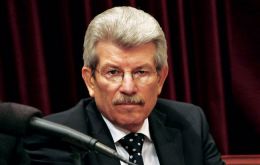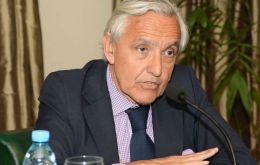MercoPress. South Atlantic News Agency
Tag: Argentine economy
-
Thursday, March 5th 2015 - 07:25 UTC
Car sales in Argentina plunge; worst February since 2009

The second month of the year marked another negative result for auto sales in Argentina, which dropped 28% compared to February last year, showing how the sector’s downward trend appears to have no end in sight. Only 41,998 vehicles were sold last month, according to the ACARA Argentine car dealership association, the lowest figure for the month since 2009.
-
Monday, March 2nd 2015 - 06:17 UTC
Argentina's economic activity up 0.6% in December; industrial production down in January

Argentina's economic activity index, EMAE, increased 0.6% in December 2014, compared to the same month of 2013, according to the country's Indec stats office latest release. This marks the third consecutive monthly growth, after previous negative results.
-
Thursday, January 22nd 2015 - 05:52 UTC
Argentina's economy forecasted to contract 1.5% this year, says IMF

The International Monetary Fund (IMF) has predicted that Argentina's economy will contract by 1.3% in 2015, a figure smaller than original estimates, as the organization revised its world projections to reflect tumbling oil prices.
-
Saturday, November 22nd 2014 - 09:13 UTC
Argentina's economy weakens in September, according to official stats

Argentina's economy weakened slightly in September as high inflation and declining purchasing power curbed sales and industrial production. A proxy for economic growth published by the government fell 0.2% on the year, the national statistics agency Indec reported Friday.
-
Friday, October 3rd 2014 - 06:20 UTC
The Argentine economy: “Thumbs down” writes The Economist

Those baffled by the Argentine economy could do worse than listen to Puff Daddy. Ask what ails the country and the answer will echo the rapper’s ode to the 100-dollar bill, “It’s all about the Benjamins”.
-
Monday, September 29th 2014 - 08:39 UTC
Argentine stats on economic growth again come under suspicion

Argentina’s government released some hopeful economic statistics last week with numbers showing that the economy climbed out of recession in the last quarter. But with skepticism over the numbers, combined with a free-falling peso, in light of Argentina’s debt dispute with holdout creditors, economists still have a grim outlook the Mercosur member economy.
-
Monday, September 22nd 2014 - 05:01 UTC
A third of Argentina's population 'vulnerable' to falling back into poverty, says World Bank

Approximately 33% of Argentina's population (or those living with between 4 and 10 dollars per day) are vulnerable to falling into poverty if faced with adverse economic conditions, the World Bank said in its 2015-2018 Country Partnership Strategy (CPS) report for Argentina.
-
Friday, August 8th 2014 - 09:07 UTC
Argentina announces measures to prop the economy and avoid redundancies

A day after Economy minister Axel Kicillof admitted problems with the Argentine economy, president Cristina Fernandez announced on Thursday a battery of measures to prop economic activity, open the labor market for young people, avoid redundancies and give the property market a thrust.
-
Tuesday, August 5th 2014 - 06:50 UTC
Barcena anticipates that Argentina will probably have negative growth in 2014

Argentina's economy probably will contract in 2014, the head of the United Nation's body for Latin America and the Caribbean, ECLAC said on Monday, as fallout from a new sovereign debt crisis will keep the country out of money markets.
-
Monday, August 4th 2014 - 07:09 UTC
Malvinas war and the 2001 and 2014 defaults, Argentina's worst mistakes in 33 years

The Falklands/Malvinas war, the 2001 default and the 2014 default are “the three events that are going to go down, in recent Argentina history, as the three worst strategic mistakes committed by the country”, according to political analyst and historian Rosendo Fraga.
